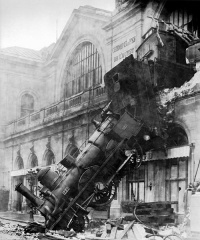End
From The Art and Popular Culture Encyclopedia
(Difference between revisions)
| Revision as of 13:08, 31 December 2013 Jahsonic (Talk | contribs) ← Previous diff |
Current revision Jahsonic (Talk | contribs) |
||
| Line 1: | Line 1: | ||
| [[Image:The Death of Marat by Jacques-Louis David (1793).jpg|thumb|left|200px|''[[The Death of Marat]]'' ([[1793]]) by [[Jacques-Louis David]]]] | [[Image:The Death of Marat by Jacques-Louis David (1793).jpg|thumb|left|200px|''[[The Death of Marat]]'' ([[1793]]) by [[Jacques-Louis David]]]] | ||
| + | {| class="toccolours" style="float: left; margin-left: 1em; margin-right: 2em; font-size: 85%; background:#c6dbf7; color:black; width:30em; max-width: 40%;" cellspacing="5" | ||
| + | | style="text-align: left;" | | ||
| + | "He who – to whatever degree – has arrived at the [[freedom]] of [[reason]] cannot feel other than a [[wandering|wanderer]] on [[earth]], - not even a [[traveler]] to a [[end|final destination]]: for [[there is no such thing]]." | ||
| + | |||
| + | --''[[Human, All Too Human]]'' (1878) by Friedrich Nietzsche, tr. JWG | ||
| + | |} | ||
| + | [[Image:Train wreck at Montparnasse 1895.jpg|thumb|right|200px|''[[Train wreck at Montparnasse]]'' ([[October 22]], [[1895]]) by Studio Lévy and Sons]] | ||
| [[Image:Morphine.jpg|thumb|right|200px|''[[Morphine]]'' ([[1894]]) - [[Santiago Rusiñol]]]] | [[Image:Morphine.jpg|thumb|right|200px|''[[Morphine]]'' ([[1894]]) - [[Santiago Rusiñol]]]] | ||
| {{Template}} | {{Template}} | ||
| - | '''Ending''' or '''end''' refers to the [[final]] point of something in space or time; | + | |
| - | ; the cessation of an effort, activity, state, or motion; [[death|death]], especially miserable; a [[purpose]], [[goal]], or [[aim]]. | + | '''Ending''' or '''end''' refers to the [[final]] point of something in [[space]] or [[time]]; the cessation of an effort, activity, state, or motion; [[death|death]], especially miserable; a [[purpose]], [[goal]], or [[aim]]. |
| ==Synonyms== | ==Synonyms== | ||
| - | * [[limit]], [[terminus]], [[termination]] | + | * [[limit]], [[terminus]] |
| ==Antonyms== | ==Antonyms== | ||
| * [[beginning]], [[start]] | * [[beginning]], [[start]] | ||
| + | |||
| + | ==Namesakes== | ||
| + | *[[The End of Books]] | ||
| + | *[[Journey to the End of the Night]] | ||
| ==See also== | ==See also== | ||
| *[[Alternate ending]] | *[[Alternate ending]] | ||
| *[[Dead end]] | *[[Dead end]] | ||
| + | *[[End times]] | ||
| *[[End (philosophy)]] | *[[End (philosophy)]] | ||
| *[[False ending]] | *[[False ending]] | ||
| *[[Happy ending]] | *[[Happy ending]] | ||
| + | *[[Last]] | ||
| *[[Multiple endings]] | *[[Multiple endings]] | ||
| - | *[[Types of fiction with multiple endings]] | ||
| *[[Twist ending]] | *[[Twist ending]] | ||
| {{GFDL}} | {{GFDL}} | ||
Current revision
|
"He who – to whatever degree – has arrived at the freedom of reason cannot feel other than a wanderer on earth, - not even a traveler to a final destination: for there is no such thing." --Human, All Too Human (1878) by Friedrich Nietzsche, tr. JWG |
|
Related e |
|
Featured: |
Ending or end refers to the final point of something in space or time; the cessation of an effort, activity, state, or motion; death, especially miserable; a purpose, goal, or aim.
Contents |
[edit]
Synonyms
[edit]
Antonyms
[edit]
Namesakes
[edit]
See also
- Alternate ending
- Dead end
- End times
- End (philosophy)
- False ending
- Happy ending
- Last
- Multiple endings
- Twist ending
Unless indicated otherwise, the text in this article is either based on Wikipedia article "End" or another language Wikipedia page thereof used under the terms of the GNU Free Documentation License; or on research by Jahsonic and friends. See Art and Popular Culture's copyright notice.
.jpg)



